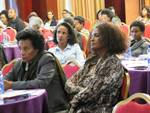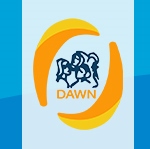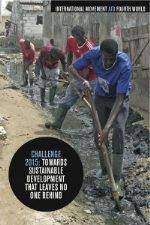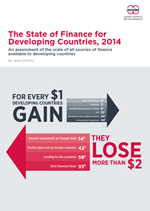Other news
Published on Mon, 2015-06-01 10:00

Photo: DAWN
|
Development Alternatives with Women for a New Era (DAWN) together with the Network of Ethiopian Women’s Associations (NEWA) organized a Public Forum on “Africa Rising: Promise or Challenge for gender equality?” in Addis Ababa on Friday, May 29, 2015 at the Harmony Hotel.
The Forum included a panel discussion on the topic, as well as the launch of DAWN’s new book, The Remaking of Social Contracts: Feminists in a Fierce New World (Zed Publications, 2014) and a special issue of the journal, Global Public Health, titled “Sexual and Reproductive Health and Rights for the next decades: what’s been achieved? What lies ahead?”.
|
Published on Fri, 2015-05-22 10:21

Photo: ITUC.
|
The FfD agenda is an important reference point for discussions on development finance, and serves as a unique space where governments, in particular from the South, are able to debate important issues like trade and foreign direct investment as well as systemic issues like the international financial architecture and financial regulation. These are the global economic issues that were absent in the origin and overall framework of the Millennium Development Goals and remain piecemeal in the proposed Sustainable Development Goals (SDGs) framework.
|
Published on Wed, 2015-05-13 10:04
They say in Africa that you do not correct an older man in public. So with all due respect to the very able team of Nobel Laureates, Intellectual minds and some Civil Society and Non State Actors who have been advising the Copenhagen Consensus, allow me to explain why I think they are wrong in asserting that we should abandon the work that the United Nations has done and instead focus all our resources and energy on what they call “ 19 Smarter Targets for Development by 2030”.
|
Published on Wed, 2015-05-13 00:00
The 2016 AWID International Forum on Women's Rights and Development “Feminist Futures: Building Collective Power for Rights and Justice” will take place from 5 to 9 May 2016 in Salvador, Bahia, Brazil.
You can contribute to the 2016 Forum by submitting a proposal to organize a session. This invitation is for those who believe in futures free from gendered oppressions, the realization of full rights for people and planet, and self-determination from the body to the nation.
|
Published on Tue, 2015-03-17 08:13
The ITUC has described an announcement by the United Nations gender body UN Women of a partnership with the Uber company to “create” a million jobs for women as undermining the very principles of the United Nations. Uber has come under fire in countries around the world for undermining incomes and working conditions of women and men who drive taxis for a living, and faced a string of accusations of union-busting, breaches of privacy, and risks to health and safety.
|
Published on Sun, 2015-03-01 18:50
DAWN briefing on Financing for Development (FfD): The article review the main elements of the FfD process in order to set current debates in a context, identify conflict areas between the different blocks of countries, and introduce some of the recommendations DAWN have been promoting with the purpose of reorienting global economic governance and development patterns towards economic, ecological, and gender justice.
|
Published on Sun, 2015-03-01 12:39
Development Alternatives with Women for a New Era (DAWN) recently launched a new book entitled, “The Remaking of Social Contracts: Feminists in a Fierce New World”, edited by Gita Sen and Marina Durano, published by ZED Books, London. This book is a result of a long process of debate and reflection that DAWN members engaged in, along with partners and allies in different civil society organizations and social movements. It follows from the previous groundbreaking books that DAWN has published through the years, starting with Development, Crises and Alternative Visions: Third World Women’s Perspectives (Sen and Grown,1987); Population and Reproductive Rights: Feminist Perspectives from the South (Correa and Reichmann, 1994) and The Marketisation of Governance (Taylor, 2000).
|
Published on Wed, 2015-02-18 14:19
International Movement ATD Fourth World presents the result of their participatory research on the Millennium Development Goals, Challenge 2015: Towards Sustainable Development that Leaves No One Behind, that brings the voices of people in poverty to the sustainable development debate. The result of years of participatory research with over 2,000 participants from over 20 countries, a majority of whom came from a background of poverty or extreme poverty, this report brings a unique voice to the global debate on international development.
|
Published on Mon, 2015-02-09 11:52
Despite snowstorm warnings and ice-cold temperatures in New York, the Financing for Development (FfD) negotiations managed to pick up speed when governments convened for the first drafting session at the end of January. They are currently negotiating the outcome of the upcoming Addis Ababa Conference on Financing for Development, which will take place on July 13-16 this year, and is planned as a key milestone ahead of the Post-2015 Summit and the UNFCCC Climate Conference later this year.
|
Published on Mon, 2014-12-22 09:28
This report provides the most comprehensive review of the quantity of different financing sources available to developing countries, and how they have changed over the past decade.
They have analysed the best available data produced by international institutions, both from the point of view of developing countries as a whole, and for low-income (LICs), lower-middle-income (LMICs) and upper-middle-income countries (UMICs) separately. The report provides figures in absolute terms in US dollars, and also as percentages of Gross Domestic Product (GDP) – a much better indicator of how important they are to the developing country in question.
|
SUSCRIBE TO OUR NEWSLETTER
Submit

|












